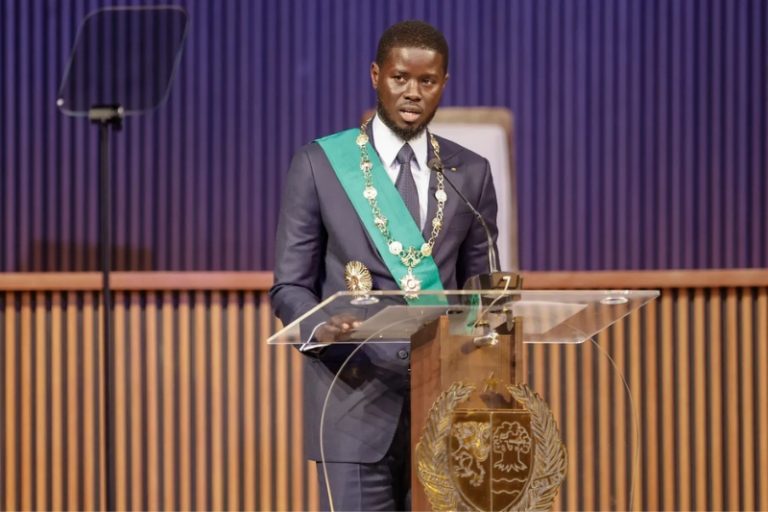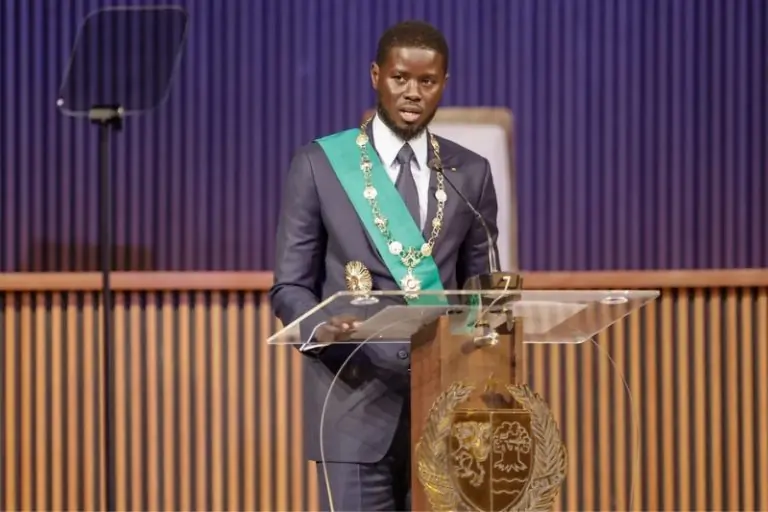

senegals historic transition bassirou diomaye faye sworn in as youngest president
In a remarkable turn of events, Senegal witnessed the inauguration of its youngest elected leader, Bassirou Diomaye Faye, marking a historic transition for the West African nation. Faye, previously little-known, ascended from imprisonment to the presidency within weeks, embodying a narrative of resilience and political transformation. His journey epitomizes the complex dynamics of Senegal’s democracy, tested during last month’s elections amidst concerns over potential authoritarianism and unrest.
Faye’s emergence onto the political stage was preceded by months of turbulence, characterized by protests and political maneuvering. His release from prison, alongside mentor and opposition figure Ousmane Sonko, following a political amnesty, signaled a pivotal moment in Senegal’s political landscape. The arrests had galvanized widespread discontent and sparked fears of a power grab by outgoing President Macky Sall. However, Faye’s inauguration represents a shift towards greater democratic consolidation, albeit amidst lingering challenges.
In his inaugural address, President Faye paid tribute to those who lost their lives or faced incarceration during the protests, acknowledging the sacrifices made in pursuit of political change. He vowed to prioritize the restoration of sovereignty and prosperity for Senegal, echoing the sentiments of a populace disillusioned with the status quo. Faye’s commitment to systemic change reflects the aspirations of Senegal’s youth, who have emerged as a potent force for political reform in the face of entrenched leadership.
As a former tax inspector, Faye brings a unique perspective to the presidency, emphasizing accountability and transparency in governance. His meteoric rise resonates with a continent grappling with generational shifts and demands for accountable leadership. Senegal’s youth, in particular, have played a pivotal role in shaping the country’s political landscape, underscoring the importance of inclusive governance and responsive leadership.
Despite the optimism surrounding Faye’s presidency, Senegal faces a myriad of challenges as it navigates this new chapter in its democratic journey. Economic disparities, youth unemployment, and regional security concerns loom large on the agenda, requiring bold and decisive action from the new administration. Faye’s ability to unite diverse factions and bridge societal divides will be crucial in addressing these pressing issues and fostering sustainable development.
Moreover, Senegal’s experience serves as a microcosm of broader trends across Africa, where the youth constitute a demographic majority clamoring for change. The emergence of young leaders like Faye underscores the need for responsive governance and inclusive political structures that empower citizens and foster socio-economic progress. As Senegal embarks on this new era under Faye’s leadership, the world watches with anticipation, hopeful for a future defined by peace, prosperity, and democratic resilience.
National teams from Africa advance their World Cup qualification pursuit as they take part in Matchday 5 of the qualifiers.…
Creative Africa Nexus (CANEX) is running the Book Factory Prize for Publishing in Africa again to award $28,000 to African…
Canadian companies have expanded their presence as major African mining stakeholders and invested more than $37 billion. Africa holds the…
The South African government wants people to plant one million trees across the nation within a single day on September…
The government's statistics regulator showed that South African inflation stayed at 3.2% during February and rose below the projected 3.3%.…
Keywords: Cape Town, African Energy Chamber, Africa, The 2025 African Energy Week (AEW) will host the top energy leaders from…
This website uses cookies.